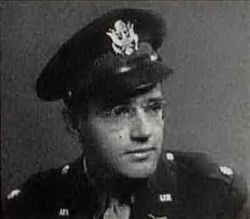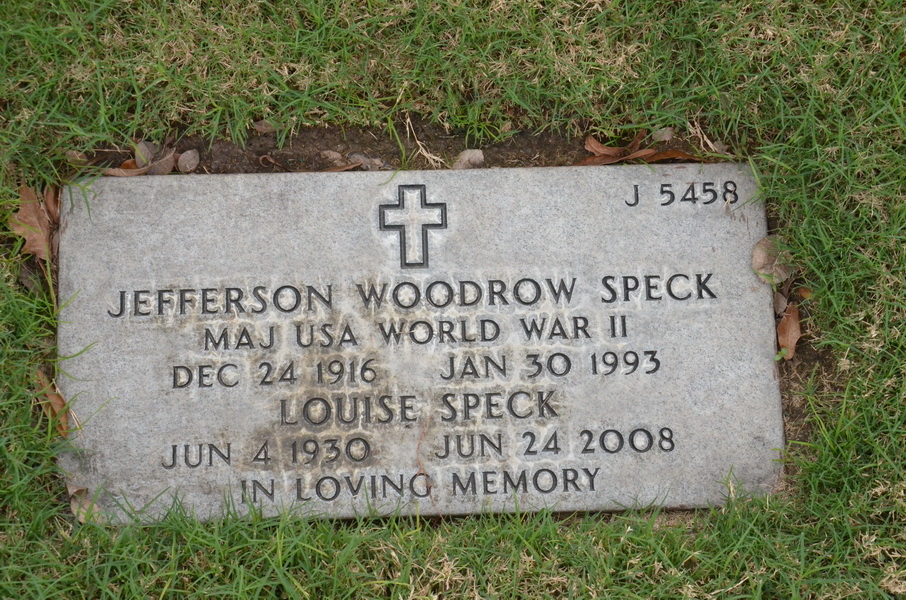He graduated in 1939 from the Georgia Institute of Technology in Atlanta, Georgia, with degrees in electrical, mechanical, and civil engineering. He later completed his Master of Science in electrical engineering at Purdue University in West Lafayette, Indiana.
He was a captain and later promoted to the rank of major in the United States Army in World War II. At the end of the war (fall of 1944), Speck was among more than 1,600 prisoners captured and taken aboard the Japanese passenger ship Oryoku Maru. At that time, he had been a POW for about three years. The men were forced to swim from the Oryoku Maru to the POW camp at Olongapo Naval Base, where they endured the last months of the war. During their captivity the men suffered from dysentery and other tropical diseases. Thirst and hunger caused many prisoners to undergo fits of insanity. Some even bit the fingers of other prisoners for a taste of blood to satisfy thirst.
After the war, Major Speck became involved in Arkansas politics. At age 33 (in 1950) he challenged the reelection of Sidney Sanders "Sid" McMath for Governor.
During the campaign, Speck's repeated calls for a debate with McMath went unanswered. Most voters in Arkansas paid little attention to the McMath-Speck contest. McMath polled 266,778 votes (84.1 percent) to Speck's 50,303 (15.9 percent). In spite of the meager showing, Speck's total was the largest raw vote ever polled by a Republican gubernatorial candidate in Arkansas.
In 1952, Speck faced Francis Cherry of Jonesboro, who had unseated McMath in the Democratic primary. Speck launched his campaign in Paragould but made only sporadic, unpublicized appearances. After Eisenhower defeated Taft at the 1952 Republican National Convention, Speck was quoted as having said that he would be the "real governor" if Eisenhower were elected because he could then as titular head of the Arkansas party make patronage recommendations. Such party stalwarts as state chairman Osro Cobb and national committeeman Wallace Townsend criticized Speck for his comment, which reflected lingering Eisenhower-Taft divisions within the state party.
Two other Republicans ran with Speck, Lee Reynolds of Conway and George W. Johnson of Geenwood, who sought positions of lieutenant governor and attorney general, respectively.
Speck received 49,292 votes (12.6 percent), compared to Cherry's 342,292 (87.4 percent), nearly a thousand votes behind his 1950 showing against McMath.
After his political career in Arkansas, Major Jeff Speck took a position teaching mathematics at a Florida college and shortly afterward, joined the Apollo manned space flight program as an engineer.
While employed with NASA, he and his family lived at Satellite Beach and later Grant, Florida. For several years he was stationed at Ascension Island as director of the tracking station there.
Speck retired to Brevard County, Florida, where his wife, Kilene Davies, died in 1988. He married a second time to Luna Hudson. He and his second wife lived in Texas. He died in 1993.
He graduated in 1939 from the Georgia Institute of Technology in Atlanta, Georgia, with degrees in electrical, mechanical, and civil engineering. He later completed his Master of Science in electrical engineering at Purdue University in West Lafayette, Indiana.
He was a captain and later promoted to the rank of major in the United States Army in World War II. At the end of the war (fall of 1944), Speck was among more than 1,600 prisoners captured and taken aboard the Japanese passenger ship Oryoku Maru. At that time, he had been a POW for about three years. The men were forced to swim from the Oryoku Maru to the POW camp at Olongapo Naval Base, where they endured the last months of the war. During their captivity the men suffered from dysentery and other tropical diseases. Thirst and hunger caused many prisoners to undergo fits of insanity. Some even bit the fingers of other prisoners for a taste of blood to satisfy thirst.
After the war, Major Speck became involved in Arkansas politics. At age 33 (in 1950) he challenged the reelection of Sidney Sanders "Sid" McMath for Governor.
During the campaign, Speck's repeated calls for a debate with McMath went unanswered. Most voters in Arkansas paid little attention to the McMath-Speck contest. McMath polled 266,778 votes (84.1 percent) to Speck's 50,303 (15.9 percent). In spite of the meager showing, Speck's total was the largest raw vote ever polled by a Republican gubernatorial candidate in Arkansas.
In 1952, Speck faced Francis Cherry of Jonesboro, who had unseated McMath in the Democratic primary. Speck launched his campaign in Paragould but made only sporadic, unpublicized appearances. After Eisenhower defeated Taft at the 1952 Republican National Convention, Speck was quoted as having said that he would be the "real governor" if Eisenhower were elected because he could then as titular head of the Arkansas party make patronage recommendations. Such party stalwarts as state chairman Osro Cobb and national committeeman Wallace Townsend criticized Speck for his comment, which reflected lingering Eisenhower-Taft divisions within the state party.
Two other Republicans ran with Speck, Lee Reynolds of Conway and George W. Johnson of Geenwood, who sought positions of lieutenant governor and attorney general, respectively.
Speck received 49,292 votes (12.6 percent), compared to Cherry's 342,292 (87.4 percent), nearly a thousand votes behind his 1950 showing against McMath.
After his political career in Arkansas, Major Jeff Speck took a position teaching mathematics at a Florida college and shortly afterward, joined the Apollo manned space flight program as an engineer.
While employed with NASA, he and his family lived at Satellite Beach and later Grant, Florida. For several years he was stationed at Ascension Island as director of the tracking station there.
Speck retired to Brevard County, Florida, where his wife, Kilene Davies, died in 1988. He married a second time to Luna Hudson. He and his second wife lived in Texas. He died in 1993.
Inscription
MAJ US ARMY
WORLD WAR II
IN LOVING MEMORY
Family Members
Sponsored by Ancestry
Advertisement
Explore more
Sponsored by Ancestry
Advertisement










